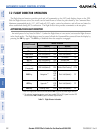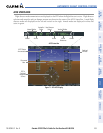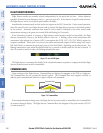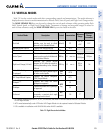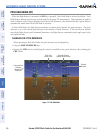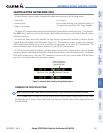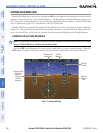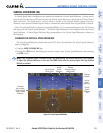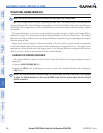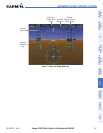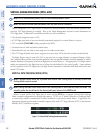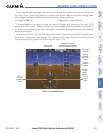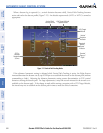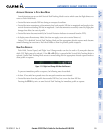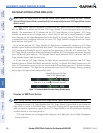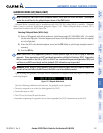
Garmin G1000 Pilot’s Guide for the Beechcraft A36/G36
190-00595-01 Rev. B
340
AUTOMATIC FLIGHT CONTROL SYSTEM
SYSTEM
OVERVIEW
FLIGHT
INSTRUMENTS
EIS
AUDIO PANEL
& CNS
FLIGHT
MANAGEMENT
HAZARD
AVOIDANCE
AFCS
ADDITIONAL
FEATURES
APPENDICESINDEX
FLIGHT LEVEL CHANGE MODE (FLC)
NOTE: The Selected Altitude should be set before selecting Flight Level Change Mode.
Flight Level Change Mode is selected by pressing the
FLC
Key. This mode acquires and maintains the
Airspeed Reference (IAS) while climbing or descending to the Selected Altitude (shown above the Altimeter).
When Flight Level Change Mode is active, the flight director continuously monitors Selected Altitude, airspeed
and altitude.
The Airspeed Reference is set to the current airspeed upon mode activation. Flight Level Change Mode is
indicated by a green ‘FLC’ annunciation beside the Airspeed Reference in the AFCS Status Box. The Airspeed
Reference is also displayed directly above the Airspeed Indicator, along with a bug corresponding to the Airspeed
Reference along the tape.
Engine power must be adjusted to allow the autopilot to fly the aircraft at a pitch attitude corresponding
to the desired flight profile (climb or descent) while maintaining the Airspeed Reference. The flight director
maintains the current altitude until either engine power or the Airspeed Reference are adjusted and does not
allow the aircraft to climb or descend away from the Selected Altitude.
CHANGING THE AIRSPEED REFERENCE
The Airspeed Reference (shown in both the AFCS Status Box and above the Airspeed Indicator) may be
adjusted by:
• Using the
NOSE UP/NOSE DN
Keys
• Pressing the
CWS
Switch, hand-flying the aircraft to attain a new Airspeed Reference, then releasing the
CWS
Switch
NOTE: If the Selected Altitude is reached during CWS maneuvering, the Altitude Reference is not changed.
To adjust the Altitude Reference in this case, the CWS Switch must be pressed again after the Selected
Altitude is reached.



